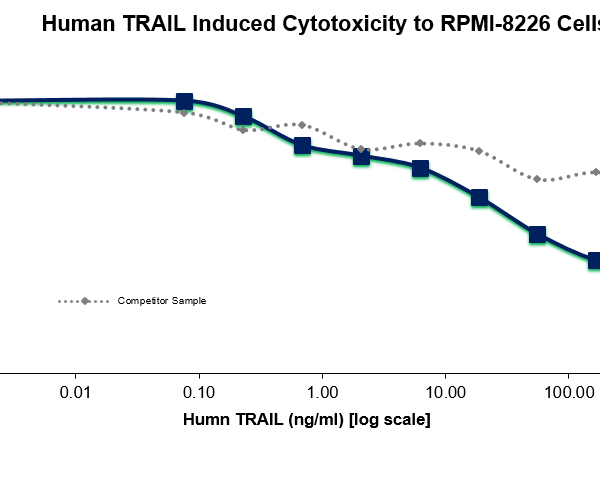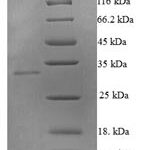Human TNFSF10 / TRAIL / APO-2L Bioactive Protein Product Attributes
Product Type: Bioactive Protein
Recombinant TNFSF10 / TRAIL / APO-2L based upon sequence from: Human
Host: QP5244 protein expressed in E. coli.
Tag: Untagged
Recommended Applications: Bioactive
Application Notes: Please contact us for application specific information for QP5244.
Bioactivity Data: Human TNFSF10 / TRAIL / APO-2L induces RPMI-8226 cell proliferation (typical ED50 is ? 15 ng/ml).
Monomer or Dimer: Monomer
Amino Acid Sequence: MRERGPQRVA AHITGTRGRS NTLSSPNSKN EKALGRKINS WESSRSGHSF LSNLHLRNGE LVIHEKGFYY IYSQTYFRFQ EEIKENTKND KQMVQYIYKY TSYPDPILLM KSARNSCWSK DAEYGLYSIY QGGIFELKEN DRIFVSVTNE HLIDMDHEAS FFGAFLVG
Purity: Greater than 90 as determined by SDS-PAGE.
Reconstitution Instructions:
Concentration of Human TNFSF10 / TRAIL / APO-2L Protein: Lyophilized. Concentration determined by reconstitution volume.
Endotoxin Levels: Less than or equal to 1.00 EUs/ug as determined by the LAL method.
Buffer: 10 mM sodium phosphate, 50 mM sodium chloride, pH 7.5
Storage Conditions: Store at -20C to -80C lyophilized. Guaranteed for 1 year at -80C reconstituted and 3 months at 4C reconstituted.
| Recombinant Human TNFSF10 / TRAIL / APO-2L Protein General Information | |
|---|---|
| Alternate Names | |
| TNFSF10, TRAIL, APO-2L, Tnlg6a, Trail, TL2, Ly81, AI448571, APO-2L, A330042I21Rik | |
| Curated Database and Bioinformatic Data | |
| Gene Symbol | TNFSF10 |
| Entrez Gene ID | 8743 |
| Ensemble Gene ID | ENSG00000121858 |
| RefSeq Protein Accession(s) | NP_001177871.1 |
| RefSeq mRNA Accession(s) | NM_001190942.1, NM_003810.3 |
| UniProt ID(s) | P50591 |
| UniGene ID(s) | Hs.478275 |
| HGNC ID(s) | HGNC:11925 |
| COSMIC ID Link(s) | TNFSF10 |
| KEGG Gene ID(s) | hsa:8743 |
| PharmGKB ID(s) | PA36618 |
| General Description of Recombinant Human TNFSF10 / TRAIL / APO-2L Protein . | |
| Tumor necrosis factor-related apoptosis-inducing ligand (TRAIL) is a member of the tumor necrosis factor (TNF) family of cytokines. TRAIL is widely produced by a variety of cell types including tumor cells, smooth muscle of the lung and spleen, cerebellar glial cells, and thyroid follicular cells. TRAIL is a cytotoxic protein that induces apoptosis in tumor cells through the activation of the death receptors DR4 and DR5. TRAIL also binds the neutralizing decoy receptors, DcR1 and DcR2. Human TRAIL is active on mouse cells. | |
Limitations and Performance Guarantee
This is a life science research product (for Research Use Only). This product is guaranteed to work for a period of two years when stored at -70C or colder, and one year when aliquoted and stored at -20C.






There are no reviews yet.